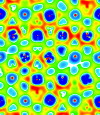 Advanced technologies for fossil energy power generation, such as ultra-supercritical steam plants and oxyfuel combustion boilers, will increase efficiency and facilitate the capture of carbon dioxide. Such advanced systems will operate at higher temperatures, pressures, and under potentially harsher and more corrosive conditions compared to traditional power plants. They require alloy-based materials that are both costeffective and able to withstand severe environments.
Advanced technologies for fossil energy power generation, such as ultra-supercritical steam plants and oxyfuel combustion boilers, will increase efficiency and facilitate the capture of carbon dioxide. Such advanced systems will operate at higher temperatures, pressures, and under potentially harsher and more corrosive conditions compared to traditional power plants. They require alloy-based materials that are both costeffective and able to withstand severe environments.
Computational models capable of predicting how alloys will perform in complex environments are important tools in successful development of new alloys, but predictive models and simulations for designing complex alloys are often limited by the availability and integrity of the data they are constructed from. Researchers at NETL, recognizing a need for more complete input data for alloy design, worked in collaboration with their partners at Pennsylvania State University to develop new databases incorporating specific design parameters to better New Databases for Development of High-Performance Alloys predict how environmental factors will affect alloy oxidation.
The research team used a combination of multi-scale computational simulation tools to develop a unique set of thermodynamic and kinetic databases for an alloy system consisting of five components: nickel, iron, aluminum, oxygen, and hydrogen. The databases help simulate the oxidation of metal alloys based on alloy composition and environmental factors, such as presence and quantity of oxygen and steam. These simulations are used to identify the best alloys to test in experiments.
According to Dr. David Alman, Director of the Structural Materials Development Division, “the power of this integrated approach is that experiments are limited to those alloy compositions with the highest likelihood of success.” The result is that high-performing alloys are developed more quickly and cheaply.
This work was part of NETL’s Innovative Process Technologies project portfolio, which is focused on developing innovative cost-effective technologies that promote efficiency, environmental performance, and availability of advanced energy systems. NETL is leveraging unique capabilities in computational simulation and metallurgy to develop tools that will shorten development times for the implementation of new alloy systems.
Alloy materials formed from NETL’s five-component alloy system are complex structures containing multiple phases that offer distinct advantages over singlecomponent or single-phase materials. The properties of complex structures can be tailored for specific uses by the appropriate combination and distribution of elements, constituents, or phases. The development of these first-of-their-kind databases will allow for more efficient and cost-effective development of complex oxidation-resistant alloys.


